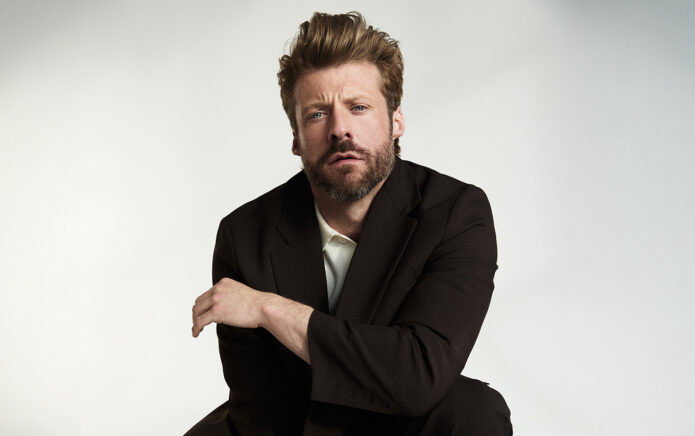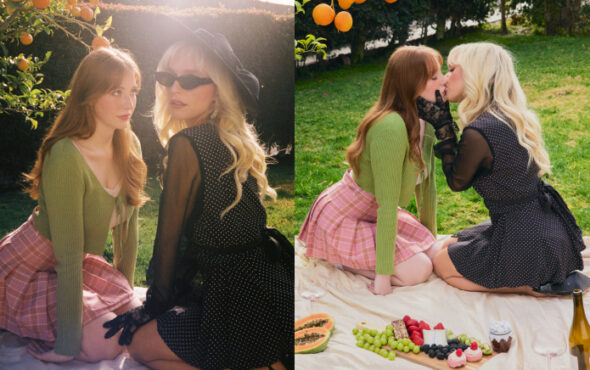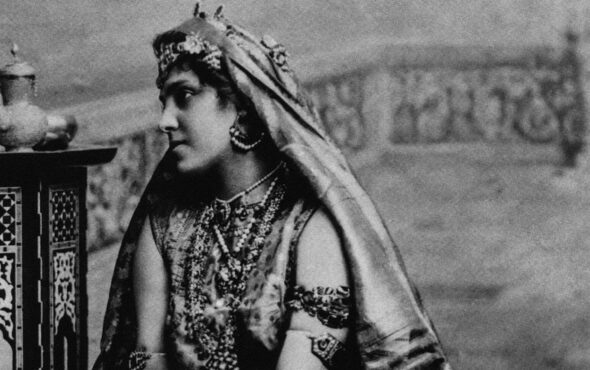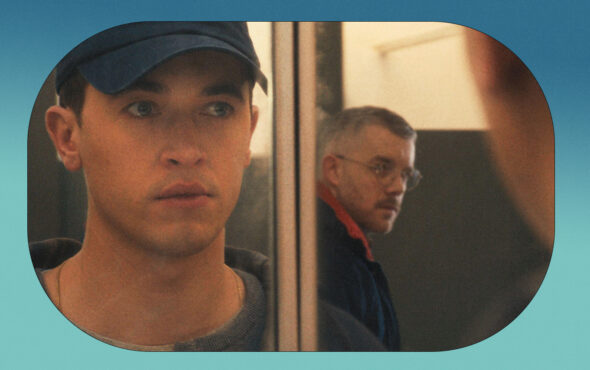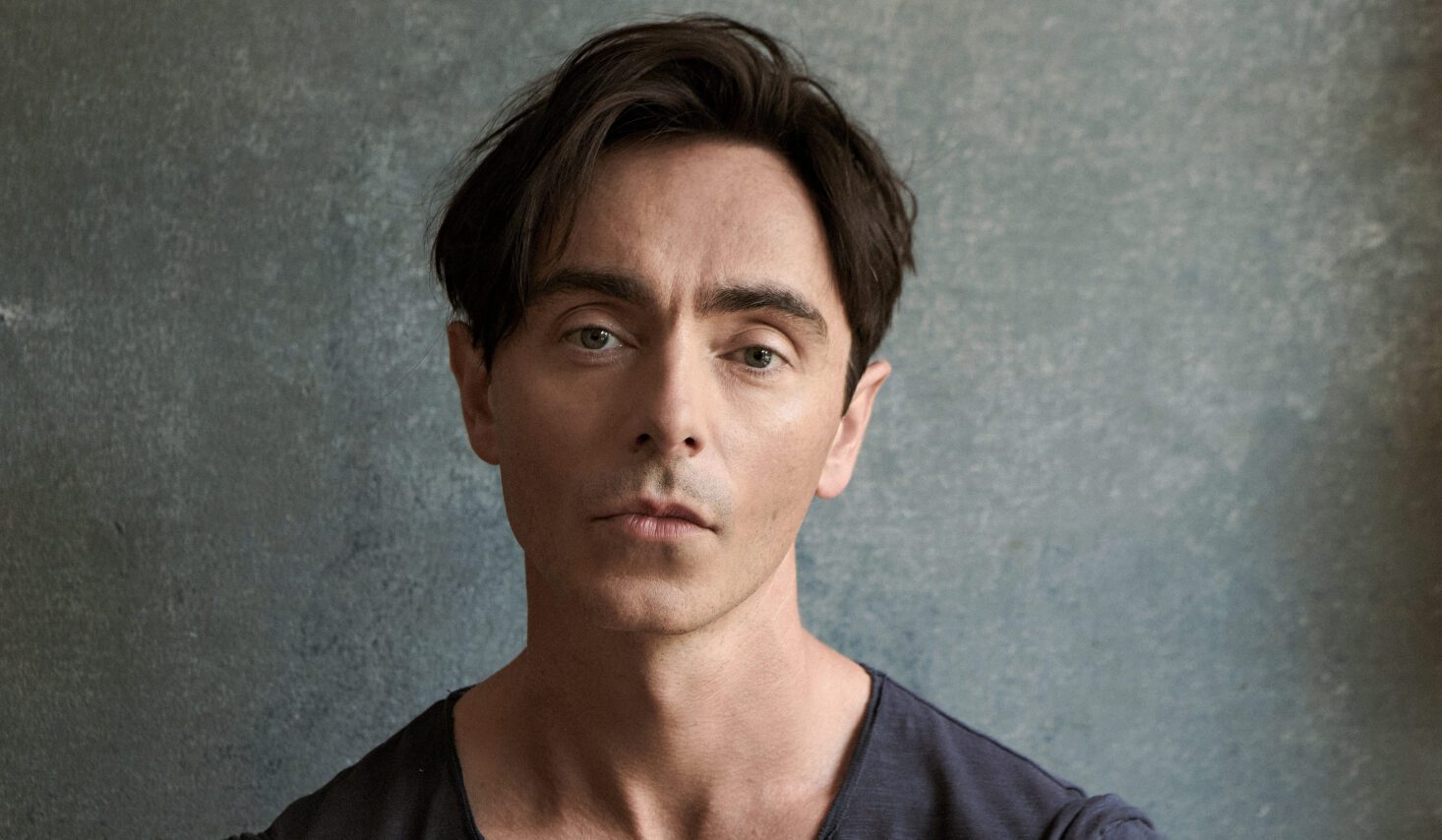
With LGBTQ+ representation still scarce on the big screen, My Policeman’s status as one of the most anticipated – and dissected, we should add – films of the year was inevitable. (It also stars Harry Styles, very famous singer, so there’s that too.) Based on Bethan Roberts’ lauded gay novel of the same name set in 1950s Brighton, the poignant drama follows the heartwreching story of Tom (Styles), a closeted police officer who marries a schoolteacher called Marion (Emma Corrin) rather than his true love Patrick (David Dawson) due to the era’s social constraints. Also starring Linus Roache, Gina McKee and Rupert Everett as their older counterparts, respectively, My Policeman made history when the cast were announced as the collective winners of the ‘Actor Award’ at TIFF Tribute, marking the first time it was presented to an ensemble rather than an individual.
Known for various roles on-stage and in British dramas such as Ripper Street, Peaky Blinders and The Last Kingdom, Dawson’s stunning performance as the gay gallerist has been singled out for praise amongst critics with several hailing My Policeman as his mainstream breakthrough. As a gay man, Dawson tells GAY TIMES that learning about this specific moment in history was “fascinating” and gave him a “greater appreciation” of the pioneers who campaigned for LGBTQ+ equality. “There will be a lot of younger people who perhaps don’t know about this period of time in British history, so I hope it opens a lot of people’s minds,” he says. “I watched Tom Daley’s documentary, Illegal to Be Me, and that’s a prime example to remind people that around the world, things like this are still continuing to happen. It also made me feel incredibly privileged to have the freedoms and the rights that we have and been fought for and achieved over the years.”
Ahead of My Policeman’s release in cinemas and on Prime Video, we spoke with David Dawson about the film, how he and Harry Styles ensured the relationship between Patrick and Tom would be as authentic as possible and why he “absolutely” wants to take on more queer roles in future projects.
David, where are you in the world right now?
I’m in a hotel room in North London. I’m filming a series down here. I moved to Manchester so I’m living out of a bag in North London! I’ve just been reading about you, that you just interviewed all the new queens for Drag Race UK?
I did! Are you a Drag Race fan?
I’m a huge Drag Race fan, yeah. I think the only time I’ve ever been properly starstruck was when I was with some mates in The Soho Theatre bar and turned around and Jinkx Monsoon was standing there. I went up to her but I did not know what to say at all.
So when can we expect your guest appearance on Drag Race UK, then?
[Laughs] Make it happen, Sam!
We’ll @ RuPaul on Twitter and we’ll make it happen.
Actually, I can now technically say I worked with RuPaul Charles. I did a beautiful animated movie earlier in the year, and I think it’s coming out at Christmas – and we’re both in it! I never got to meet Mama Ru, but I can say I worked with her at least.
Let’s talk My Policeman. By the end, I was absolutely blubbering. How excited are you to finally get this film out into the world?
Oh, incredibly, yeah. We wrapped on this in June last year and you have to acknowledge that it’s not yours anymore and I’m excited for it to be for the audience, and to find out how people respond to what we made. We all cared very much about the story so it means a lot to me to hear what people think of it. I’m glad you had a moving response to it, thank you.
I know you’ve worked with Michael Grandage on the stage a few times, but why were you interested in taking on such a complex character like Patrick Hazelwood?
Initially, what I was fascinated by with Patrick was how skilfully out of necessity he has to have two personas: the public persona in which he can not only survive but thrive and achieve his ambitions, travel the world and curate art, and then balancing that with the private man and the vulnerability of him behind closed doors. He’s somebody who, just like everybody else, wants to find love and joy in the world. What I found most fascinating was asking myself, ‘What is a safe space for someone like Patrick living through that time?’ The symbolism of his apartment is one of the only spaces where he can be authentically himself. Also, doing research into the history of gay bars as safe spaces gave me a greater appreciation of what those buildings mean. As a gay man myself, he had to live during that time in our country’s history… To walk into a room with no other affirmation in your life, at all, and to see other people who are just as ambitious and clever and passionate as you… All of that fascinated me about playing Patrick.
The experience of every LGBTQ+ person is wildly different, of course, but did you see any part of yourself in Patrick when you read the script?
I’m quite an introvert, quite a quiet lad and acting is what I’ve always wanted to do since I was a little boy. That was my way of expressing myself in the world. I suppose with Patrick, that public persona he puts on is an act. In private, he’s far more reserved.
Was there anything specific you learned about LGBTQ+ rights, or lack thereof, during this moment in history?
I watched a wonderful BBC drama called Against the Law, which had a lot of talking heads of gay men who had lived through this moment in history. What horrified me the most was the conversion therapies that were in place that were mainstream. It was deeply affecting to hear those men’s stories. There’s a scene later in the movie, a particularly violent scene, that reminded me of that documentary. When you research that time, you can have a feeling of anger and hurt… Years ago, I played Tony Warren – the man who created Coronation Street back in 1960 – in a drama and I was lucky enough to become his friend. He was an out gay man in 1960 and he used to take me for dinners. He’s no longer with us, sadly, but he also told me stories of joy and the passion of clandestine romances, so that was also very helpful in terms of Patrick’s mentality. He’s a person who’s proud of his sexuality and does not see himself as a victim and is determined to find joy and love and passion and art in the world.
My Policeman is based on a fictional novel, but of course, the events are not too dissimilar to how gay and queer people were treated in the 50s. As a queer actor, what does it mean to you to bring a story to life that carries so much emotional weight for your community?
Even in some small way, if My Policeman adds to the conversation… There will be a lot of younger people who perhaps don’t know about this period of time in British history, so I hope it opens up a lot of people’s minds. Even though it’s a period piece about 50s Britain, hopefully there’s poignancy in the fact that this is not something for us all to go, ‘Oh, that was then and everything’s fine now.’ I watched Tom Daley’s documentary, Illegal to Be Me, and that’s a prime example to remind people that around the world, things like this are still continuing to happen. It also made me feel incredibly privileged to have the freedoms and the rights that we have and been fought for and achieved over the years. I just watched It’s A Sin last year and I was heartbroken by it, but thought it was stunning. That was a similar kind of learning curve of learning about our past and rhetoric that was mainstream as well.
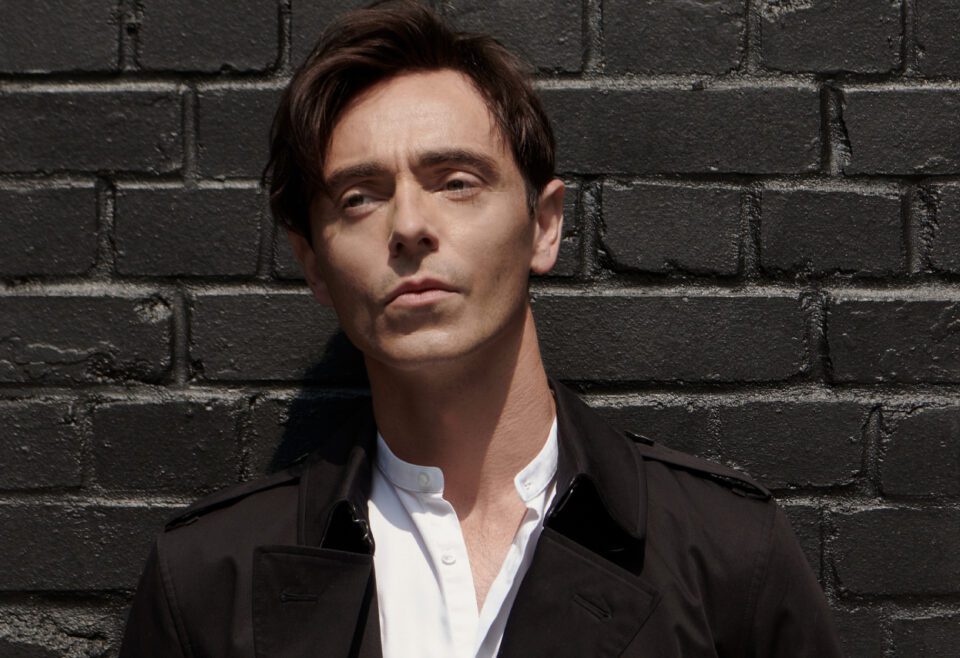
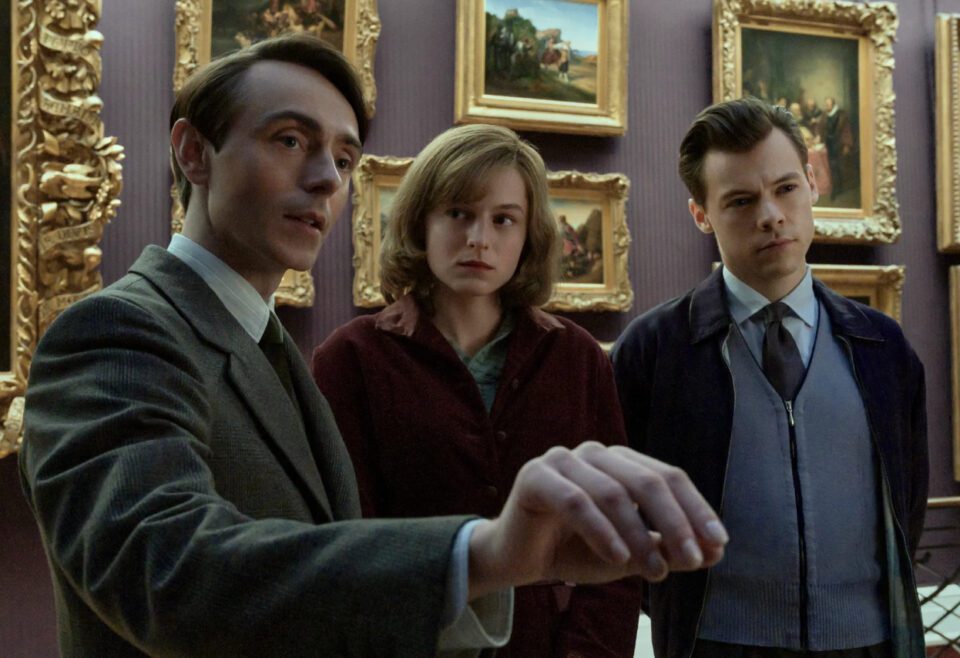
In previous interviews and overall coverage of My Policeman, there’s been a lot of emphasis around the gay sex scenes between you and Harry. As this marks your first queer role on such a mainstream level, has it surprised you how many outlets have focused on the queer intimacy rather than other aspects of the film?
[Laughs] Weirdly enough, around two weeks ago, yes. A lot of people did ask that question. I understand why, but weirdly, this last week nobody has, so I’m hoping that’s because it’s already been asked and it’s out there and done. What I will say, in terms of working with Michael Grandage and his determination for them to be beautiful scenes… The process of making those scenes is something we were right in the centre of, it’s been a collaborative process and we had an Intimacy Coordinator. The four of us, Harry, Emma, Michael and me, we wanted to create a beautiful story through those scenes.
I first learned about Intimacy Coordinators when I interviewed Ita O’Brien, who worked on It’s A Sin. It’s baffling to think how, in the past, actors were just thrown into a love scene without direction or choreography?
Surrounded by 30 crew! People may assume that if you bring somebody on board like that, then it might constrain what you’re going to do; make it less organic or real. But actually, it makes you feel so supported and – is it cheesy to say? – empowered because you constantly communicate. Me and Harry did this the whole way through, we were constantly checking in with each other. On the day, you actually have more freedom because you’re just playing those people rather than worrying about, ‘Is my colleague comfortable with this?’ We created a kind of dance. It’s choreography, like any other scene. Why wouldn’t you choreograph a scene like that?
You act opposite Harry Styles, an up-and-coming singer-songwriter. How did you both work together off-screen to ensure the relationship between Patrick and Tom was as authentic as possible?
Michael’s from the theatre, so we had the great luxury of having three weeks to rehearse together. Me, Harry and Emma got in a room together and that gave us time to bond and create a friendship and a chemistry. Also, me and Harry would work together, Emma and Harry would work together and then the three of us. You were never party to things your character would not know in the story, because the story’s full of secrets that are kept. That was also very effective and useful. When I read the script before meeting the other actors, you know that for this love story to work, you hope that you’re going to be working with someone who you can put your trust in. From day one, I got all of that from Harry, truly. He’s incredibly down-to-earth and hard-working. That promise of communication was amazing. One thing that the Intimacy Coordinator said that sticks with me is that anything that we work out in the rehearsal room, if on the day we shoot it and we no longer feel comfortable, then that’s fine. We acknowledge that and we change it. I thought that was incredibly powerful.
I know this story has quite a definitive ending, but people always want a sequel! So, I have to ask: would you be open to revisiting this character in the future?
Absolutely! Interestingly, there’s a gap in what you know of them from the 50s to the 90s, so there’s far more to explore in-between that time period.
What kind of impact would you like My Policeman to have on viewers, particularly queer viewers who were alive during this moment in time?
This is a hard question because in everything I’ve ever done, I’ve been far more fascinated by what people’s responses to a piece is without… You know when you’re involved with something so much, that you don’t quite… know? As long as people feel something from the work you’ve created, then I’m happy. I think I’d be far more fascinated by what people make of it rather than me hope for something.
How did you feel when you watched it?
I watched it with my agent and I turned around and she was crying at the end. Whenever I watch something I’m in, I normally watch it the first time with the sound off so you can enjoy what the DOP did or what your fellow actors did. Does that sound weird? It’s London Film Festival on Saturday so I’ve got my fella, my family and friends coming to see it. I’m elated to see what they make of it.
Your filmography doesn’t boast a lot of explicitly queer roles. Can we expect more in the future? Is that something you’d like to explore?
Yeah, absolutely. When we were on set, me and Emma were talking. I’ve always wanted to play The Emcee, since I was a kid, and they wanted to be Sally Bowles, so maybe one day…
My Policeman will be released in cinemas in the UK and US on 21 October and worldwide exclusively on Prime Video starting 4 November.
